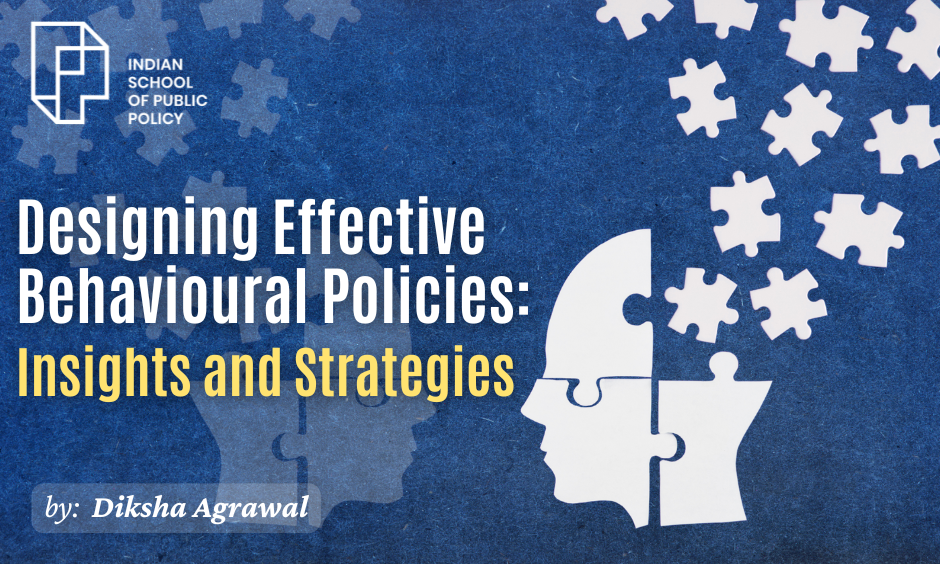
Designing Effective Behavioural Policies: Insights and Strategies

Public Policies are drawing heavily from behavioural sciences and reshaping policy formulation worldwide. To understand how this is happening, we first need to understand what behavioural policy is and what motivates policymakers to adopt it into their policymaking strategy.
What is Behavioural Policy
The formulation of behavioural policy follows a multi-disciplinary approach, employing disciplines like economics and psychology to design interventions that can nudge individuals towards certain actions and decisions. Traditionally, policies were designed with certain assumptions about human behaviour in mind; for example, people always act in ways that promote their self-interest and hence will respond to financial incentives like subsidies and penalties. Modern Policy Design acknowledges that a broad spectrum of psychological, social, and contextual factors influence human behaviour. This approach helps influence people’s behaviour in subtle but powerful ways.
NEED FOR BEHAVIOURAL POLICY IN THE INDIAN CONTEXT
The Government of India undertook the challenge of solving the problem of open defecation as part of Swachh Bharat Abhiyan, launched on 2 October 2024. One of the ambitions was to make India open defecation-free by improving access to toilets nationwide. It was observed that despite the building of toilets, people continued with their old ways of defecating in the open due to various social, religious, and psychological factors. In some communities, toilets are considered profane and should be placed far away from the house to maintain the sanctity of the house. In many joint families, men and women feel uncomfortable using the same toilet.
The government soon realised the need to incorporate behavioural science strategy into the policy. To initiate behavioural change, more than 5 lakh satyagrahis and foot soldiers were recruited to enforce the use of toilets amongst communities. One local person was recruited as satyagrahi in each village, serving as an ambassador of change. People were expected to listen to and emulate a local more than an outsider. Swachh Bharat Mission employed another behavioural insight: evoking a sense of disgust at the idea of open defecation. People who have openly defecated for years do not respond much to concerns about hygiene and sanitation, but appealing to their emotions by attaching a sense of disgust to the act nudges them to behave in desirable ways. Campaigns that elicit emotional reactions were carried out by satyagrahis, equating open defecation as being tantamount to eating one’s excreta as flies sit on excreta and then sit on food. This led to emotional reactions associated with disgust, nudging people to abandon their old habits.
KEY INSIGHTS on how to devise behavioural policies:
It is important to understand that the first step to designing behavioural policy is to move beyond financial incentives and penalties. Let us look at how that can be done:
- Make use of NUDGES: The traditional assumption in economics that people are always rational decision-makers is no longer valid. Individual choices are influenced by various biases and motivations. One, hence, needs to nudge people to make certain choices. A slight nudge or change in how certain choices are presented to the decision maker can significantly alter decision outcomes. For example, healthier food choices placed at eye level can lead to better dietary choices without coercive strategies.
- Leveraging Social Influences: Humans are known to be social creatures and make decisions according to recommendations from friends, family, and other social beings. For example, a community initiative that promotes eating healthy might feature local families who share their diets. The initiative can normalise healthy eating by presenting these recipes as popular and well-loved within the community and inspire others to try new, nutritious dishes. Social proof and herding push people to copy others’ behaviour, which is common in collectivist societies. It is a technique often used in India in the marketing space but has not been incorporated adequately into the policy domain. Incorporating these strategies may prove to be helpful in the better implementation of policies.
- Enhancing Convenience and Accessibility: If certain desirable behaviours become easier to achieve, people are more likely to choose them. For example, expanding access to fresh produce in underserved areas can improve public health.
- Utilising Feedback and Rewards: Immediate feedback and rewards can also help influence decision-making. For example, regular and timely health checkups in communities can help people get immediate feedback, encouraging them to take timely action.
CONCLUSION
According to Howlett and Jarvis, notable figures in public policy research, this new perspective must be approached with humility and caution. In the traditional approach, the policy was based on high confidence because precise calculations of fines and payments were expected to drive results. However, such precision is rarely attainable in behavioural research without thorough investigation and testing of various strategies. This shift from the old paradigm, which valued exactitude, may present challenges and legitimacy issues, especially in the short term, as the field adjusts to this more flexible and exploratory approach. However, behavioural policymaking holds great promise despite these challenges as it enables a more nuanced understanding of human behaviour, making policy more relevant to real-world decision-making processes. As the field continues to evolve, this approach offers a powerful tool/strategy to address contemporary societal challenges.
Register your Interest to Study at ISPP

Diksha Agrawal
Programme Advisor – Admissions
Diksha Agrawal, a Sociology graduate from Miranda House and postgraduate from Delhi School of Economics, embarked on her professional journey as a research fellow for Prashant Kishore’s Jan Suraaj initiative. Travelling across various districts of Bihar, she gained profound insights into the diverse needs of communities, igniting a deep interest in the field of public policy.
Furthering her engagement in politics and governance, Diksha served as a consultant for Inclusive Minds, political consultancy working for Indian National Congress during the Chhattisgarh elections. This role provided her with invaluable insights into the socio-political landscape of the state, reinforcing her determination to drive positive change through effective policy formulation and implementation.


